
We’re eating ourselves into obesity and spending a fortune on weight loss pills
The demand for weight loss medicine is rising, but it only addresses the symptoms, not the causes. “We face intense commercial pressure to eat and drink more,” says a professor of public health.
Trine Tetlie Eik-Nes, who treats and researches patients struggling with their body image and weight, understands why many want weight loss medications.
“We have few medical treatment methods for weight reduction. Exercise and diet have been shown to have little effect,” she says.

Eik-Nes believes that living with the significant stigma faced by individuals who are overweight and obese in society is quite demanding.
“Many people diet their whole lives. Now, they finally see hope. Therefore, I fully understand that both patients and the healthcare system view this as a salvation,” she says.
Are we placing too much hope in medicines?
Eik-Nes suggests that there could be an overemphasis on the potential of medicines, given the complexity of issues like overweight and obesity.
“We’ve had the same challenge with antidepressants and medication for ADHD. It's not the case that we’ve solved these mysteries even though the medications have been described as breakthroughs,” she says.
Eik-Nes points out the noticeable discrepancy in how health funds are allocated: A significant amount goes to medication, yet minimal resources are devoted to preventing overweight and obesity.
“When people develop a weight problem, they should be helped, but we do little to prevent people from developing a difficult relationship with their body,” she says.
There are many areas where prevention pays off, she believes.
“Factors like economic hardship, bullying, and mental health problems are areas where effective prevention and treatment can make a significant difference,” she says.
67 per cent of the population is too large
Steinar Krokstad is a professor of public health at the Norwegian University of Science and Technology (NTNU).

He agrees with Eik-Nes that the solution to the obesity problem must lie elsewhere than with each individual.
“Overweight and obesity have become a very big societal and health problem. Today, about 67 per cent of the Norwegian population is overweight or obese, despite the fact that the most have actively tried to avoid it,” he says.
If someone manages to find ways to solve this, such as with weight loss medications, it could be of great importance to the individual, Krokstad thinks.
“The issue with weight loss medications is that they attempt to address a problem generated by society on an individual basis. This approach is funded by personal expenses and taxpayer money. However, such strategies don't offer any preventive benefits to the broader population, focusing solely on tackling existing problems,” he says.
A brilliant business idea
The public health expert believes that to effectively prevent these issues, it is crucial to identify the root causes and examine the factors influencing our living conditions.
“The current political ideology prioritises economic growth, allowing commercial entities to freely influence the population to buy more. We face intense commercial pressure to eat and drink more,” Krokstad says.
The business idea is brilliant, Krokstad thinks.
“As people consume more, spurred on by the industry, their demand for food grows, boosting sales further. The most affordable options tend to be energy-rich and unhealthy. Once people put on weight, the industry can profit from an array of solutions like weight loss drugs, diet products, weight loss surgeries, and fitness programmes. Even after a workout, people are enticed to buy energy bars and energy drinks, perpetuating the weight cycle. It’s a clever commercial loop that traps consumers,” he says.
Most viewed
No content
Social differences
All social groups in Norway have gained weight in the last few decades. But the weight gain is strongest among people with low education and low income, Krokstad points out.
“It’s people with poor means who need weight loss medications the most,” he says.
But today, the regulations for reimbursement from the National Insurance Scheme are very strict. Almost no one gets weight loss medications on a reimbursable prescription today, according to Marte Kvittum Tangen, head of the Norwegian Medical Association.
This adds a considerable social aspect to the situation, according to Krokstad.
“If each individual has to pay for the medicines themselves, it obviously becomes easiest to get access for those who need it the least,” he says.
More than hunger
Being overweight and obese involves much more complexity than merely curbing hunger, Eik-Nes believes. She is an associate professor at NTNU.
“Our eating behaviour depends on an extremely large number of other factors. The reasons why we eat more than we need are varied. It’s often a mix of individual vulnerability and the environment in which they grow up,” she says.
For the last five years, she has led a treatment study for patients with morbid obesity and binge eating disorder.
More relaxed around food
Eik-Nes reports that some patients find the combination of medication and psychotherapy helpful.
“Many who have had eating disorders for a long time may have difficulties differentiating between hunger and satiety. The regulation has been challenging. Those who describe benefiting from the medication say that they have become more relaxed around food. With the medication and treatment of the eating disorder, they can more easily tell if they are physically hungry or full,” she says.
However, many patients report no benefit from the medications and have stopped due to side effects.
“It’s a challenge that most desire a weight reduction much greater than what the medications provide,” she says.
Studies indicate an expected weight reduction of 10-20 per cent with medication use.
“From my experience, it’s rare for patients to lose that much. Many patients have tried various medications without any effect at all,” Eik-Nes says.
Alternative options
Steinar Krokstad believes that political interventions could prevent the issue of overweight and obesity from becoming such a significant societal concern, if there is genuine commitment to do so.
“We have a good understanding of effective political strategies. Regulations on pricing, availability, and age limits are effective tools in public health efforts. For instance, we have imposed much stricter operating hours on the state-owned liquor store (Vinmonopolet) than in the general food industry. That's because we know it has an impact,” he says.
Today, grocery stores in many parts of the country are open until 10 pm or 11 pm, and you can buy food at 24-hour outlets.
“If policymakers were to tighten these opening hours, it would likely reduce food intake in the population. However, there may be significant opposition to implementing such regulations,” he says.
Tax the industry
Imposing taxes on the industry could be another viable approach, so that those causing the problems would also pay for the consequences. This would allow us to allocate more resources to additional public health initiatives, Krokstad believes.
“Imagine if private business interests could also contribute to the collective effort of promoting good public health. It could be a tremendous opportunity! But, from a political standpoint, they are exempt from all societal responsibility and are allowed to focus solely on profit,” he says.
———
Translated by Alette Bjordal Gjellesvik
Read the Norwegian version of this article on forskning.no


































